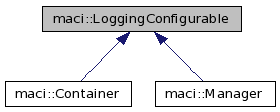import "maci.idl";

Classes | |
| struct | LogLevels |
Public Member Functions | |
| LogLevels | get_default_logLevels () |
| void | set_default_logLevels (in LogLevels levels) raises (ACSErrTypeCommon::IllegalArgumentEx) |
| stringSeq | get_logger_names () |
| LogLevels | get_logLevels (in string logger_name) raises (maciErrType::LoggerDoesNotExistEx) |
| void | set_logLevels (in string logger_name, in LogLevels levels) raises (maciErrType::LoggerDoesNotExistEx, ACSErrTypeCommon::IllegalArgumentEx) |
| oneway void | refresh_logging_config () |
Detailed Description
Interface through which the logging settings of a container or manager can be configured at runtime.
Note that the logging configuration should always be done persistently in the CDB, from where it is read at process startup, or re-read later when refresh_logging_config is called. The additional logger configuration that can be done directly using this interface only allows temporary changes of log levels. These log level changes are not written to the CDB, so that when the container or manager is restarted, the old values from the CDB will be used again.
To keep this interface simple, advanced changes of log queue size, dispatch packet size and so forth are not supported in this interface; they must be done in the CDB instead.
Member Function Documentation
| LogLevels maci::LoggingConfigurable::get_default_logLevels | ( | ) |
Gets the log levels of the default logging configuration. These levels "belong" to the entire process and are used by all loggers that have not been configured individually.
| stringSeq maci::LoggingConfigurable::get_logger_names | ( | ) |
Gets the names of all loggers, to allow configuring their levels individually. The names are those that appear in the log records in the field "SourceObject". This includes the container logger, ORB logger, component loggers, and (only C++) "GlobalLogger"s which get treated as one named logger.
| LogLevels maci::LoggingConfigurable::get_logLevels | ( | in string | logger_name | ) | raises (maciErrType::LoggerDoesNotExistEx) |
Gets log levels for a particular named logger. If the returned field LogLevels.useDefault is true, then the logger uses the default levels (see get_default_logLevels()) and the local and remote levels have no meaning; otherwise the returned local and remote levels apply.
| oneway void maci::LoggingConfigurable::refresh_logging_config | ( | ) |
Commands the container or manager to read in again the logging configuration from the CDB and to reconfigure the loggers accordingly. This allows for persistent changes in the logging configuration to become effective, and also for changes of more advanced parameters.
Notice that this is a oneway method and therefore there cannot be return values or user exceptions. Only CORBA runtime exceptions due to communication issues can be thrown.
| void maci::LoggingConfigurable::set_default_logLevels | ( | in LogLevels | levels | ) | raises (ACSErrTypeCommon::IllegalArgumentEx) |
Sets the log levels of the default logging configuration. These levels are used by all loggers that have not been configured individually.
| void maci::LoggingConfigurable::set_logLevels | ( | in string | logger_name, | |
| in LogLevels | levels | |||
| ) | raises (maciErrType::LoggerDoesNotExistEx, ACSErrTypeCommon::IllegalArgumentEx) |
Sets log levels for a particular named logger. If levels.useDefault is true, then the logger will be reset to using default levels; otherwise it will use the supplied local and remote levels. Throws IllegalArgumentEx if a provided level is invalid.
: Define if/when LoggerDoesNotExistEx should be thrown. It could make sense to allow setting levels for a component logger even before that component gets loaded in the container.
The documentation for this interface was generated from the following file:
 1.7.0
1.7.0